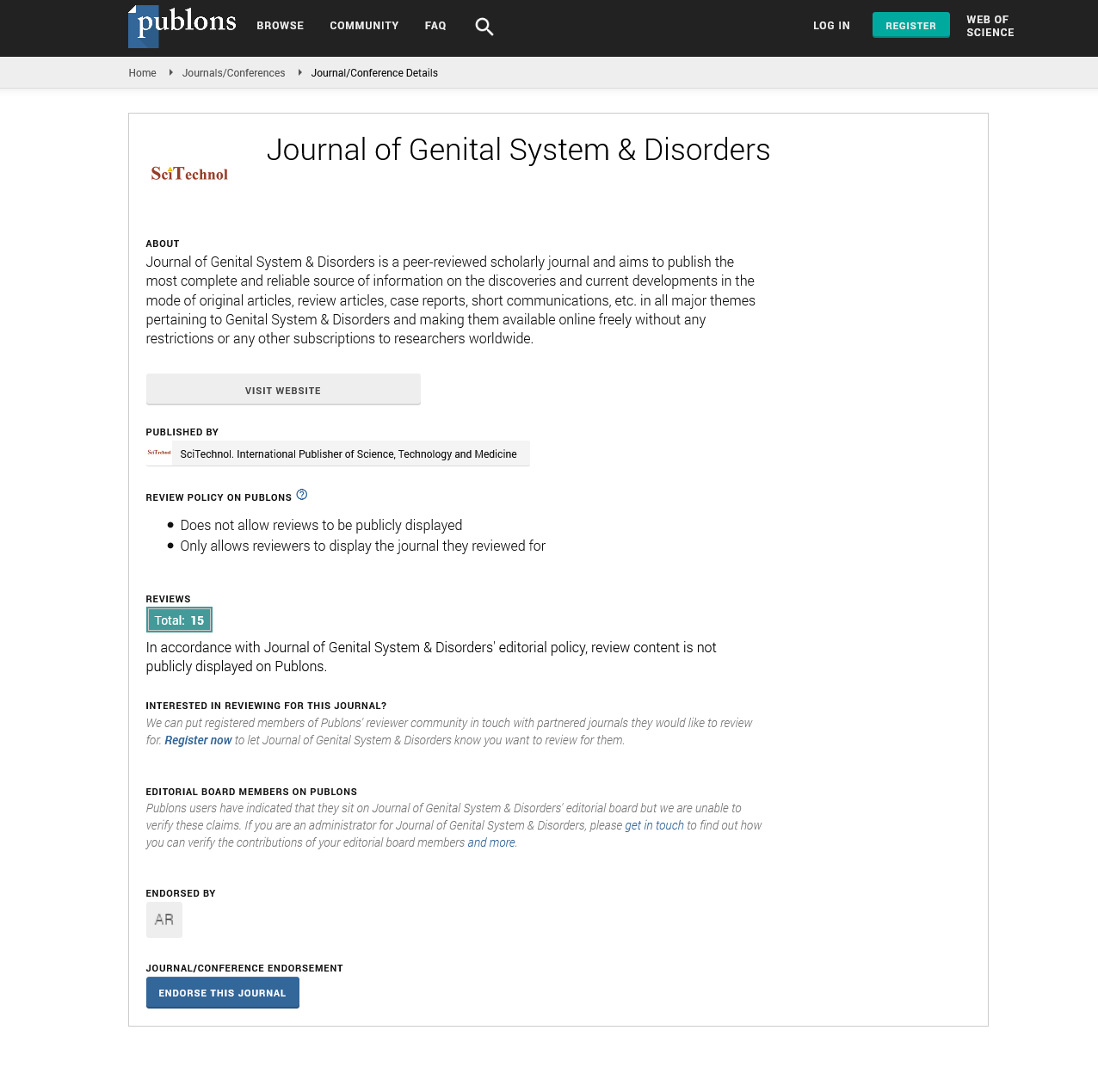Editorial, J Genit Syst Disord Vol: 7 Issue: 1
Antibiotic Therapy as Infertility Management
Ioannis Papakonstantinou*
Department of Forestry and Biodiversity, Tripura University, Suryamaninagar, Agartala, India
*Corresponding Author : Ioannis Papakonstantinou, MD
Department of Obstetrics and Gynecology, University of Athens, Greece
Tel: 30 690 6564964
E-mail: dr.ipapakonstantinou@gmail.com
Received: February 09, 2018 Accepted: February 10, 2018 Published: February 12, 2018
Citation: Papakonstantinou I (2018) Antibiotic Therapy as Infertility Management. J Genit Syst Disord 7:1 doi: 10.4172/2325-9728.1000e109
Abstract
Today infertility is a common problem affecting as much as 15% of couples. Infertility is caused by a variety of reasons, with male reproductive system abnormalities accounting for a large percentage (approximately 35%) and the anatomical anomalies or lesions related to female reproductive organs equally responsible (also approximately 35%). Endometriosis, ovulation abnormalities, autoimmune disorders, genetic abnormalities and asymptomatic genital infections are also major causes of female and male infertility respectively. Unexplained infertility, presented in a large percentage of couples (25-30%), is usually due to undetectable microbial infections by the routine diagnostic techniques available. So far one of the most successful treatment methods available for unexplained infertility is the use of antimicrobial therapy. However, further research is required for the absolute confirmation of the benefits of the antimicrobial therapy as a means of infertility management.
Keywords: Antibiotic; Infertility; Endometriosis; Autoimmune disorder
Introduction
Couples that have been tested for all infertility factors but showed no pathological causes, and have normal sexual contact within the fertile days but still fail to conceive they are considered to present unexplained infertility. Approximately 25-30% of couples who look into possible IVF treatment as a mean of infertility management are thought to belong to this group [1]. In particular, a woman is considered to suffer from unexplained infertility when she has normal ovulation, no endometriosis or inaccessible tubes due to adhesions, has frequent contacts on ovulation days (10th-14th day of the cycle) for more than one year but she is still unable to conceive, considering, of course, her partner has normal sperm production [2]. Unexplained male infertility is observed in men whose routine semen testing, shows no abnormalities, as well as their physical and endocrine examinations present no pathological results. Other possible factors for unexplained male infertility are erectile dysfunction, abnormal coital factors, immunological causes and sperm dysfunction [3].
The urogenital system is one of the most frequent localizations of microbial infection of the human body. Urinary tract infections are the first occurrence of urological disease. Genital tract infections are of particular interest because of their frequency and the serious problems they cause including unexplained infertility. Research shows that often, by the time a bacterial infection is detected within the urogenital tract is detected, both in men and women, fertility in both sexes can be seriously compromised. These infections are caused by a multitude of microorganisms [4].
Ureoplasma (U. Urealyticum) and mycoplasma (M. hominis) are microorganisms that infect the urogenital region of a large proportion of sexually active men and women. These microorganisms can cause urethritis, salpingitis, endometritis and chorioamnionitis (during pregnancy), but most worrying is that both the ureoplasma and the mycoplasma have been implicated in cases of male and female infertility, premature pregnancy and miscarriage. In women this is because a uterus with excessive microbial consistency is not considered a hospitable environment for egg fertilisation. As for men, these two microorganisms can cause reduced sperm motility and increased abnormal forms in sperm, resulting in men suffering from infertility [5,6]. The colonization of the genital tract from these microorganisms can be persistent (and not always traceable) if no treatment is instituted for both male and females presenting unexplained infertility. Even more a multitude of sexually transmitted diseases (STDs) can infect a variety of different tissues of the urogenital tract in both sexes and cause many functional alternations that result to infertility in both men and women. Examples of bacterial STDs related to human infertility are Chlamydia trachomatis, Treponema pallidum, Neisseria gonorrheae and many more [4].
Only antimicrobial therapy has been adequately described as a therapeutic option in order to overcome both unexplained and symptomatic infertility caused by microbial agents. With regards to assisted reproductive technology and reproductive medicine, antimicrobial therapy, using antimicrobial agents directed in a wide range of conditions, is often employed in order to manage infertility presented either in men and women or amongst the couple [7]. More than a decade ago, Attila Toth, MD (a fertility specialist), during his research from January 2002 to April 2004, on 52 couples with numerous earlier unsuccessful IVF cycles, observed the outcome of IVF cycles after antibiotic therapy implementation. Depending on his results, he concluded that a substantial number of failing IVF cycles is due to the existence of intrauterine microbial infection, undetectable during pre-treatment diagnostic routine, thus a prophylactic course of antibiotic therapy can be proven useful in the treatment of infertile or subfertile couples [8].
Antimicrobial therapy used in reproductive medicine as well as assistive reproductive technology aims in one of five main categories, the improvement and management of female infertility, the improvement and management of male infertility, for diagnostic and interventional purposes as part of investigational strategies, for the therapy and management of oocyte retrieval and in embryo transfer preparation interventions (or in a combination of these whenever more than one reasons are indicated). However, the research data regarding the benefits and disadvantages of antimicrobial therapy in infertility management so far is considered inconclusive; although there is growing evidence that when certain microorganisms are considered, antimicrobial therapy can be proven advantageous [7].
Conclusion
Recent studies recommend that the use of wide spectrum antibiotics in a prophylaxis basis can aid the maintenance of the normal microbial flora, especially in females, and the elimination of the danger of diminishing the useful Lactobacillus species found inside the human reproductive tract. An additional possible consideration for upcoming research would be to categorize the prophylactic antibiotics that refer particularly to the virulent microorganisms in reproductive microflora, while not disturbing the beneficial lactobacilli [9].
References
- Quaas A, Dokras A (2008) Diagnosis and treatment of unexplained infertility. Rev Obstet Gynecol 1: 69-76.
- Lindsay TJ, Vitrikas KR (2015) Evaluation and treatment of infertility. Am Fam Physician 91: 308-314.
- Hamada A, Esteves SC, Nizza M, Agarwal A (2012) Unexplained male infertility: diagnosis and management. Int Braz J Urol 38: 576-594.
- Ruggeri M, Cannas S, Cubeddu M, Molicotti P, Piras GL, et al. (2016) Bacterial agents as a cause of infertility in humans. New Microbiol 39: 206-209.
- Huang C, Zhu H, Xu K, Wang S, Fan L, et al. (2015) Mycoplasma and ureaplasma infection and male infertility: a systematic review and meta-analysis. Andrology 3: 809-816.
- Jafar K, Robeena F (2011) Prevalence of Mycoplasma hominis and ureaplasma urealyticum among women with unexplained infertility, with and without vaginitis and cervicitis. African J Microbiol Res 5: 861-864.
- Levi-Setti PE, Mulazzani GE (2016) Antibiotics use in infertile couples and during art procedures: a review. J Fertil In Vitro IVF Worldw Reprod Med Genet Stem Cell Biol 04: e120.
- Toth A, DR (2018) How Antibiotic Therapy Works to Ensure Fertility. Fertile vs. Infertile: How infections affect your fertility and your baby’s health, Fenestra Books, Arizona, USA.
- Sirota I, Zarek SM, Segars JH (2014) Potential influence of the microbiome on infertility and assisted reproductive technology. Semin Reprod Med 32: 35-42.
 Spanish
Spanish  Chinese
Chinese  Russian
Russian  German
German  French
French  Japanese
Japanese  Portuguese
Portuguese  Hindi
Hindi 
